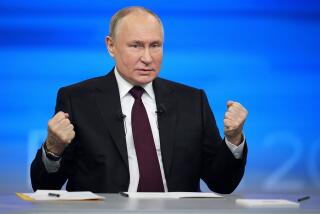Gorbachev Decries Iraq’s ‘Perfidy’ : Soviet Union: He says Moscow bears special responsibility because it sold Baghdad weapons that were used in the invasion.
- Share via
MOSCOW — Soviet President Mikhail S. Gorbachev swept back onto the political scene Friday, denouncing Iraq’s “perfidy” in invading Kuwait and calling publicly for a massive selloff of state property to spur economic reform.
Tanned and vigorous after 17 days of vacation in the Crimea, Gorbachev told a military audience in the Black Sea port city of Odessa that the Soviet Union will try to defuse the Persian Gulf crisis by means of diplomacy and participation in international moves.
“We intend to to act exclusively in the framework of collective effort aimed at settling this conflict,” he said.
Foreign Minister Eduard A. Shevardnadze, speaking in Moscow after meeting with his West German counterpart, said his country could send troops to the Persian Gulf region if the United Nations sponsors a multinational force, and the Soviet Union approves the plan.
Gorbachev, in an hourlong speech aired on national television, said that when Iraq invaded Kuwait, “we witnessed an act of perfidy and a blatant violation of international law and the U.N. Charter--in short, a violation of everything the world community now pins its hopes on.”
He noted that the Soviet Union bears special responsibility because it sold Iraq weapons that were used in the invasion.
Soviet officials have given tacit consent to the buildup of U.S. forces in the Persian Gulf and the U.S.-led naval blockade of Iraq, but they have shown no eagerness to send in their forces. They have appealed repeatedly for a peaceful solution.
Shevardnadze reiterated the Kremlin’s call for the Military Staff Committee of the U.N. Security Council to deal with the Gulf crisis, and said the U.S. officials he talks with daily support the idea.
“Now we have a pretty good mutual understanding on this with the United States,” he told reporters.
Asked if the Soviet Union will send troops to the Persian Gulf, he replied: “If there is a decision by the Security Council.”
Pressed to elaborate, he said, “If the Soviet Union votes for it, it will certainly take part.”
He was asked whether the Soviet Union had objected to the introduction of U.S. troops into Saudi Arabia, and he said he had been assured that the troops are “a temporary phenomenon, and if tension continues, it seems to me the Security Council will move more actively and decisively.”
The Military Committee that Shevardnadze referred to is made up of the chiefs of staff of the permanent members of the Security Council--the Soviet Union, the United States, Britain, China and France.
“The potential of this committee is very great,” Shevardnadze said.
He was reluctant to predict events in the gulf and would not commit himself on whether his government will close its embassy in Kuwait, as the Iraqis have demanded.
“We’re carrying on negotiations with Iraqi representatives,” he said. “We’ll see in the course of the near future what results our efforts will bring.”
In his address, Gorbachev raised the possibility that under military reforms beginning next year, the 4-million-strong Soviet army might be transformed into a smaller, all-volunteer force.
“Our armed forces were established to handle the tasks of the Cold War, (and) that war is over now,” he told his audience after observing war games near the Black Sea coast.
After he left Moscow for the Crimean Peninsula, it was announced that Gorbachev had agreed with his populist critic Boris N. Yeltsin, the president of the Russian republic, to oversee jointly an economic rescue program, a move some thought signaled the radicalization of Gorbachev. His televised remarks seemed to confirm that.
“We should see the task of selling off state property as our first priority,” Gorbachev said. He said critics on the right who accuse him of betraying socialism want to retain their privileged jobs, but that what he envisages is the renewal of socialism.
Yeltsin had said Thursday that Gorbachev was breaking off his summer holiday to return to Moscow to supervise a group of economists working out a 500-day economic recovery plan, but Gorbachev gave no hint of his plans in his speech. He could return to the Crimea, which is only a short flight from Odessa.
Touching on what may be the most urgent Soviet political issue of the day, Gorbachev called for a new federation treaty to be signed by the 15 Soviet republics by year’s end. Negotiations have been under way for weeks, snarled by the desire in many republics for greater independence than Moscow is willing to give them.
Gorbachev warned of “a sea of blood and tears” if nationalist groups try to tear the Soviet Union apart by force.
Shevardnadze and West German Foreign Minister Hans-Dietrich Genscher announced at a joint news conference that they had made enough progress in their talks to be able to wrap up negotiations on German reunification at the next meeting of the four World War II victors and the two Germanys, scheduled for Sept. 12 in Moscow.
More to Read
Sign up for Essential California
The most important California stories and recommendations in your inbox every morning.
You may occasionally receive promotional content from the Los Angeles Times.












